The Somerset Newsflash, August 2022
Important Dates
- August 11-20, 2022: Skowhegan State Fair
- August 18, 2022: Preserving the Maine Harvest Webinar Series – Canning and Freezing Tomatoes
- August 22, 2022: Irrigation for Small-Scale Farmers
- August 23, 2022: Farm Visit: Raising Poultry
- August 30 – September, 2022: Wild Blueberry Production Course
- September 1, 2022: Deadline to apply for Master Gardener Volunteer Training
- September 22, 2022: Preserving the Maine Harvest Webinar Series – Freezing Fruits & Vegetables
- September 28, 2022: Enrollment opens for Maine Gardener Training and Maine Horticulture Apprentice Training
- October 9, 2022: Maine Fiber Tour and Trail
- October 20, 2022: Preserving the Maine Harvest Webinar Series – Preserving Apples
Contents
The News in the County
The Skowhegan State Fair is Happening Now!
 If you haven’t already, be sure to come visit us at the fair! Alice set up a beautiful display to teach about EFNEP programming. Brett has been spending some time at the fair chatting with visitors and has displays set up about irrigation, cover crops, soil, and raised beds. Karen will be at the fair most of the week supporting the 4-H youth of Somerset County who are participating in a variety of shows and competitions. This year, we have 37 entrants at the 4-H Exhibit Hall including independent members and 6 clubs from Somerset, Franklin, and Waldo counties.
If you haven’t already, be sure to come visit us at the fair! Alice set up a beautiful display to teach about EFNEP programming. Brett has been spending some time at the fair chatting with visitors and has displays set up about irrigation, cover crops, soil, and raised beds. Karen will be at the fair most of the week supporting the 4-H youth of Somerset County who are participating in a variety of shows and competitions. This year, we have 37 entrants at the 4-H Exhibit Hall including independent members and 6 clubs from Somerset, Franklin, and Waldo counties.
Brett’s Bulletin: Issues Impacting Somerset’s Farms & Gardens
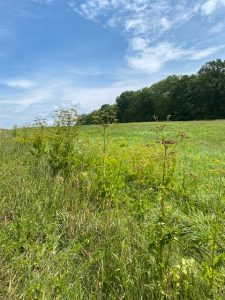 Invasive plants impact people, agriculture, and the environment
Invasive plants impact people, agriculture, and the environment
As we begin to move past the middle of summer, now is a perfect time to assess the landscapes around us and take inventory of what has changed. With the prolonged drought some susceptible or poorly located woody and herbaceous perennials have succumbed to lack of water, while grasses and many other shallow rooted plants along roadsides have gone dormant or died back prematurely. In times of stress in the landscape the most competitive plants tend to proliferate. Unfortunately, many invasive plants and noxious weeds are highly competitive in less-than-ideal conditions. Now is a great time to identify and remove these plants from the landscape.
One plant of particular interest to Somerset County is Wild Parsnip, Pastinaca sativa. This plant is not native but is found throughout Maine, most commonly along roadsides and in fields. The sap of this plant causes phytophotodermatitis, a condition causing severe skin rash and blisters. The agricultural impact of wild parsnip comes in the form of increased occupational hazard for farmers and farmworkers, decreased quality of forage, straw, and hay products, and health issues in livestock. It is currently being monitored by the Maine Natural Areas Program (MNAP) and is classified as having the potential to be invasive. It is one of over 100 entries in the MNAP Advisory List.
For plant identification, further information, or advice on managing invasive plants in your community please contact our office.
Alice’s Adventures: EFNEP Updates for the Month of August
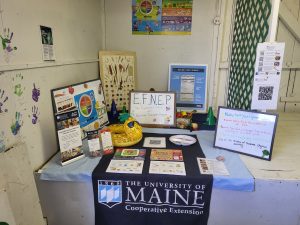 This month, Alice has been at the Solon Elementary School’s summer rec program teaching a gardening and nutrition series called MyGarden MyPlate. This series goes over the many steps it takes for food to reach our plates as well as healthy eating habits.
This month, Alice has been at the Solon Elementary School’s summer rec program teaching a gardening and nutrition series called MyGarden MyPlate. This series goes over the many steps it takes for food to reach our plates as well as healthy eating habits.
The News
Upcoming Horticulture Training Programs
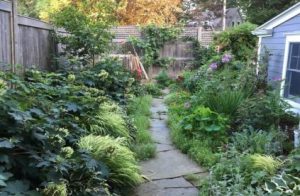 Are you looking for a horticulture training that will provide you with 40-50 hours of educational content and the skills you need to succeed? UMaine Extension offers three horticulture training programs to fit your needs.
Are you looking for a horticulture training that will provide you with 40-50 hours of educational content and the skills you need to succeed? UMaine Extension offers three horticulture training programs to fit your needs.
- Master Gardener Volunteer Training is recommended for novice or experienced gardeners who wish to receive horticulture training and give back to their community through volunteer work. Enrollment in this program is open now and the deadline to apply is September 1.
- Maine Horticulture Apprentice Training is a micro-credential program for those who are or will be considering employment in the horticulture industry. Enrollment for this program will open September 28.
- Maine Gardener Training is recommended for those who wish to receive horticulture education for use in their home garden.
- Enrollment for this program will open September 28.
Preserving the Maine Harvest Webinar Series 2022
Thursdays, August 18, September 22, October 20, 2022
12:00-12:45 p.m.
Join the University of Maine Cooperative Extension food preservation staff for a lively discussion and demonstration on how to preserve Maine foods throughout our growing season.
$5 suggested donation per class.
Registration is required – Participants will receive the Zoom information after registering for this event. For more information and to register, visit the program webpage.
If you need technical assistance, please contact Eavan Sibole at eavan.sibolelittle@maine.edu or 207.781.6099.
UMaine Harvest for Hunger and MOFGA Grow-A-Row
Two options if you have extra produce this summer:
- Home gardeners, farmers, businesses, schools, and civic groups…you can make a difference!
- What would your summer be like without the tastes of sweet corn-on-the-cob, crisp green beans or juicy melon? Help make the tastes of summer a reality for all Mainers by joining other farmers and gardeners who are donating fresh fruits and vegetables to University of Maine Harvest for Hunger. There may be gleaners available to harvest your extra produce in the field. Learn how you can help on the Harvest for Hunger Webpage.
- Food Donations and Grow a Row for MOFGA!
- MOFGA’s common kitchen is seeking donations of organically raised food to support our Fair volunteers this fall and our other educational and planning events during the year. Would you consider planting a row of carrots, cabbage, onions, dry beans, or other veggies you’re eager to grow? We are also accepting donations of other local and organic products like hone and maple syrup too. If you have questions or would like more information, reach out to common kitchen manager and fair food liaison, Wendy Watson, at wwatson@mofga.org and let us know you are donating and/or growing a row for donation. MOFGA and our volunteers thank you!
Helpful Gardening Resources
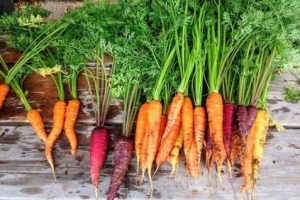 We want to remind you that Cooperative Extension offers all kinds of helpful resources for Maine gardeners. If you have a garden, you may want to check out some of these:
We want to remind you that Cooperative Extension offers all kinds of helpful resources for Maine gardeners. If you have a garden, you may want to check out some of these:
- On Demand Webinars: Bundles of three to four prerecorded webinars about starting and maintaining a home orchard, gardening with native plants, composting and soil health, and seed selection and starting. The webinars allow viewers to watch and learn at their own pace and include lists of recommended resources. The webinar bundles are offered on a sliding scale fee of $0–$30. More information about how to purchase the bundles is available on the gardening webpage. For more information or to request a reasonable accommodation, contact Rebecca Long, 207.743.6329; extension.gardening@maine.edu.
- Growing Maine Gardeners: An initiative led by UMaine Extension’s Home Horticulture team to address the increased demand for gardening education throughout the state of Maine and to provide additional support for beginner gardeners.
- Garden Mentorship Program: direct technical assistance and encouragement via phone or email throughout the season from trained Master Gardener Volunteers.
- Maine Farm Products and Pick-Up Directory: The directory provides information on available local farm products and alternative pick-up options developed by farmers statewide to accommodate the recommended social distancing in light of COVID-19.
- Identifying insect pests: Charley Armstrong, will identify pest samples via images. See instructions for submitting an insect specimen.
- Identifying plant diseases: Contact your local county office.
- Tick testing: Ticks are being tested on a limited basis. See instructions for submitting a tick sample.
- Publication orders: We are still processing orders from our publication catalog, including pesticide application training materials.
- Soil testing: The Analytical Lab and Maine Soil Testing Service remains open and is taking samples with a priority on commercial samples. If you need to drop off a sample, you can place it in the box outside of Deering Hall; do NOT enter the building.
- General gardening questions: Contact your county office. Emails are preferred. If it’s necessary to leave a voicemail, please leave your email address (if available) or a mailing address in addition to your phone number.
- Maine Home Garden News: Consider subscribing to this helpful and inspiring monthly newsletter.
Greenhouse Plastic Recycling Program
University of Maine Cooperative Extension opened its Greenhouse Plastic Recycling (GPR) program April 19 with drop-off sites available statewide through November 21.
Plastic eligible for recycling is clear, low-density polyethylene #4 (LDPE #4) used to cover greenhouses, high tunnels, hoop houses and other agricultural structures. The program will also accept white overwintering plastic bundled separately from clear plastic. UMaine Extension’s GPR program video explains the process in full.
This will be the third year for the recycling program, begun in 2020 with a one-year Maine Department of Environmental Protection Waste Diversion grant. The program’s goal is to collect at least one-third of Maine’s annual waste greenhouse plastic, diverting that waste for use in new plastic products. To date, the program has collected almost 2,600 pounds of this plastic waste.
There is no program fee; registration is required. Register and find more information on the GPR program website. More information also is available by contacting Matt Wallhead, 207.581.2949; agplasticrecycling@maine.edu.
The News in Agriculture
NEW! Maine Farmers Market Price Report
The Maine Farmers Market Price Report is a website where weekly data is uploaded and available for all to access.
Made possible with funding throughout the Maine Department of Agriculture, Conservation, and Forestry and the support of the Maine Federation of Farmers Markets, Maine Organic Farmers and Gardeners Association, Maine Farmland Trust and the University of Maine, this new site is now up and running, piloting a new statewide price report which will be focused on farmers market prices for a limited number of crops (in 2022) with the aim of building a tool that will expand into other markets and products in the future.
Irrigation for Small-Scale Farmers
What do you need to know to install a new irrigation system?
Join us for this brief presentation to find out.
Monday, August 22, 2022, 1:00 p.m., via Zoom
Presenter: Dr. Sumon Datta, Assistant Extension Professor and Extension Agricultural Engineer
There has been a 300% increase in irrigated areas from 1998 to 2018 in Maine. Recent extreme climatic events are driving Maine farmers to invest in expanding existing irrigation systems or installing new ones. Several factors impact the decision to select or install a new system.
Plan to join Dr. Sumon Datta via Zoom for a brief presentation on what small-scale farmers should consider before they expand or install a new irrigation system. There will be plenty of time for him to respond to questions about your situation.
Registration is required and those who register will get a link/password to the live session as well as a link to a recording after the live session.
Wild Blueberry Production: A Five Week Course for Beginning Farmers and UMaine Students
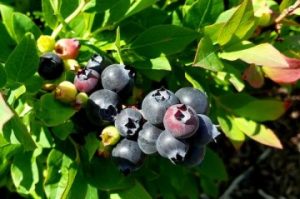 This course is an introduction to growing wild blueberries in Maine. The course covers field selection, agronomics, integrated pest management, pollinators, climate change challenges, economics, and an introduction to how this industry functions. The course includes one field trip during class time to observe an established blueberry field. This class is open to current students, beginning and established farmers.
This course is an introduction to growing wild blueberries in Maine. The course covers field selection, agronomics, integrated pest management, pollinators, climate change challenges, economics, and an introduction to how this industry functions. The course includes one field trip during class time to observe an established blueberry field. This class is open to current students, beginning and established farmers.
PSE 270: Wild Blueberry Production (1 credit)
Dr. Lily Calderwood, Dr. Phil Fanning, Dr. Seanna Annis, Dr. Yongiang Zhang, and guest lecturers
Fall semester – August 30 – September 29, 2022 (5 weeks)
Tue/Th 5:30 – 7:30 p.m. (online, synchronous)
Prerequisites: Background in farming or serious interest in farming wild blueberries.
$50 – $150
For more information and to register, visit the course webpage.
Climate Smart Farming Tools: Winter Cover Crop Planning
Do you have your cover crop seed ordered and plans for when you’ll get it in? The Cornell Climate Smart Tool Library has a tool to help you evaluate how late is too late for planting cover crops. This is a great tool to help determine when you’ll get the most benefit for your effort planting different species of cover crops. Check out the Winter Cover Crop Planting Scheduler and other Climate Smart Farming Tools.
Find information abut coper crop planting dates, seeding depths and rates, benefits, drawbacks, and more with the Northeast Cover Crop Council’s Species Explorer.
Farm Visit: Raising Poultry
Calling all New Farmers — and Anyone with Fewer Than 10 Years of Experience in Farming!
Come join UMaine Extension’s Boots-2-Bushels farm training program on August 23, 2022, from 9:00 a.m.-1:00 p.m. at Grace Pond Farm in Thomaston, Maine for a farm visit about raising poultry with Grace Pond Farm’s Rhiannon Hampson. Rhiannon and her husband, Gregg, own and operate Grace Pond Farm, a small, diversified, organically certified livestock and dairy farm in Thomaston, Maine. This farm visit is a good chance for new farmers to learn about raising poultry and to network with other new farmers and service providers.
Boots-2-Bushels (B2B) is a 9-month hands-on market gardening education and training program for military veterans and their family members. The program is sponsored by UMaine Cooperative Extension’s Maine AgrAbility in partnership with the Veterans Administration and the Maine Organic Farmer & Gardener Association. PLEASE NOTE: You do not have to be a veteran nor be enrolled in B2B to attend this farm visit.
Who Should Attend?
New farmers based in Maine who have fewer than 10 years of experience in farming with a desire to learn more about raising poultry on a small, diversified, organic livestock farm.
Limited to 10 participants.
When: Tuesday, August 23, 2022, 9:00 a.m. – 1:00 p.m.
Where: 530 Main St., Thomaston, Maine
Presenter: Rhiannon Hampson, Grace Pond Farm
Fee: $10
For more information and to register, visit the program webpage.
Calf and Heifer Management in New England
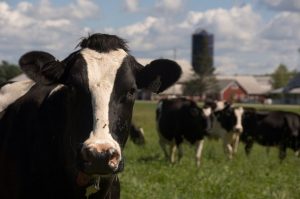 Raising calves and rearing heifers is one of the most critical jobs on a dairy farm because these animals become the future milk producers for the dairy herd. Calves and heifers are a major investment, ranking second or third in costs behind feed and labor. It costs about $2,500 to raise a calf from birth to calving in New England, therefore, it is important to optimize feeding, comfort, and health. Dairy cows are ruminants, and proper development of the rumen during the first year of life is critical for the success of the lactating cow. This review will provide farmers with ideas on how to implement the aforementioned factors.
Raising calves and rearing heifers is one of the most critical jobs on a dairy farm because these animals become the future milk producers for the dairy herd. Calves and heifers are a major investment, ranking second or third in costs behind feed and labor. It costs about $2,500 to raise a calf from birth to calving in New England, therefore, it is important to optimize feeding, comfort, and health. Dairy cows are ruminants, and proper development of the rumen during the first year of life is critical for the success of the lactating cow. This review will provide farmers with ideas on how to implement the aforementioned factors.
Read more in the UMaine Extension publication.
Study Finds Plant-based Protein Not as Nutritious as Real Meat
A new study by researchers at Ohio State University found that human cells currently do not absorb the same level of nutrients from plant-based protein as they do from meat from animals. While plant-based proteins have risen in popularity, this study shines a light on how the body reacts differently when compared to meat.
This research is probably not surprising to many in the animal science community. Previous research from the Journal of Nutrition has shown plant proteins may compromise bone health.
Source: American Society of Animal Science Taking Stock, June 30, 2022
UMaine Extension Crop Specific Newsletters Available
Did you know that UMaine Extension has several crop or species specific newsletters that highlight timely production and pest concerns? Newsletters include:
- Cows and Crops
- Maine Beef
- Maine Tree Fruit
- Pest Alert (Potato)
- Sweet Corn
- Spotted Wing Drosophila
- Strawberry
- Wild Blueberry.
Learn more and find archived editions here.
PFAS Resource Hubs
- Guide to Investigating PFAS on Your Farm, UMaine Extension
- MOFGA Roadmap for Addressing PFAS Contamination
- PFAS Emergency Relief Fund, MOFGA & MFT
- PFAS Farmer Wellness Fund
- Understanding PFAS and Your Home Garden
The News in 4-H
2022-23 4-H Membership and Volunteer Renewals
Keep an eye out for renewal paperwork, which will be coming out soon. Volunteers, remember that you must have a background check every three years. Contact Karen Giles (karen.giles@maine.edu) at the Somerset County Extension office for more information.
Fridays on the Farm is Back!
All youth ages 12-18 are invited to join Maine 4-H staff for Fridays on the Farm, a series of hands-on learning experiences for Maine teens. In this series of farm tours, participants will explore possible careers in agriculture, learn about the Maine Food System, and practice real-life farm skills. Participants may join one, or all of the farm visits. 4-H enrollment is not a requirement for participation, so share this opportunity with your friends! All youth ages 12-18 are welcome to participate. For more information on the available farm tours or to register visit the Fridays on the Farm registration page.
Looking for 4-H Alumni & Members Attending UMaine!
If you are a current or former 4-H member planning to attend UMaine this fall, know of a 4-H member currently attending UMaine, or know of a recent 4-H alumni attending UMaine, read this! Collegiate 4-H is an opportunity for 4-H alumni and college students interested in supporting the mission of 4-H to be involved in 4-H after high school. We are currently exploring starting a Collegiate 4-H Club at UMaine with an anticipated start date for the 2022 fall semester. Simply fill out this short form to let us know if you think you might be interested!
The News in Homemakers
Summer Newsletter Published
Head on over to the Homemakers Newsletter page to check out the latest issue of the Maine Extension Homemakers Newsletter.
Help Us Collect Can Tabs

All Somerset County Homemakers Clubs are collecting can tabs to be recycled for cash that will be donated to the Ronald McDonald house. Anyone is welcome to contribute to the effort and can tabs can be donated by contacting any of the Extension Homemakers or by dropping them off at the Somerset County Extension office.
Volunteer in Somerset County!
Would you or someone you know like to become more engaged in volunteerism throughout Somerset County? Consider joining Homemakers! The Somerset County Extension Homemakers are always welcoming new members. Please visit the Maine Extension Homemakers website for general information about the program or reach out to the Somerset County Extension Homemakers President, Rita Fortin with any questions or to express interest. Rita can be reached at 207.453.2945 or at ritafortin2@gmail.com. You may also contact the Maine Extension Homemakers Coordinator, Lisa Fishman at 800.287.1421 or at lisa.fishman@maine.edu.

